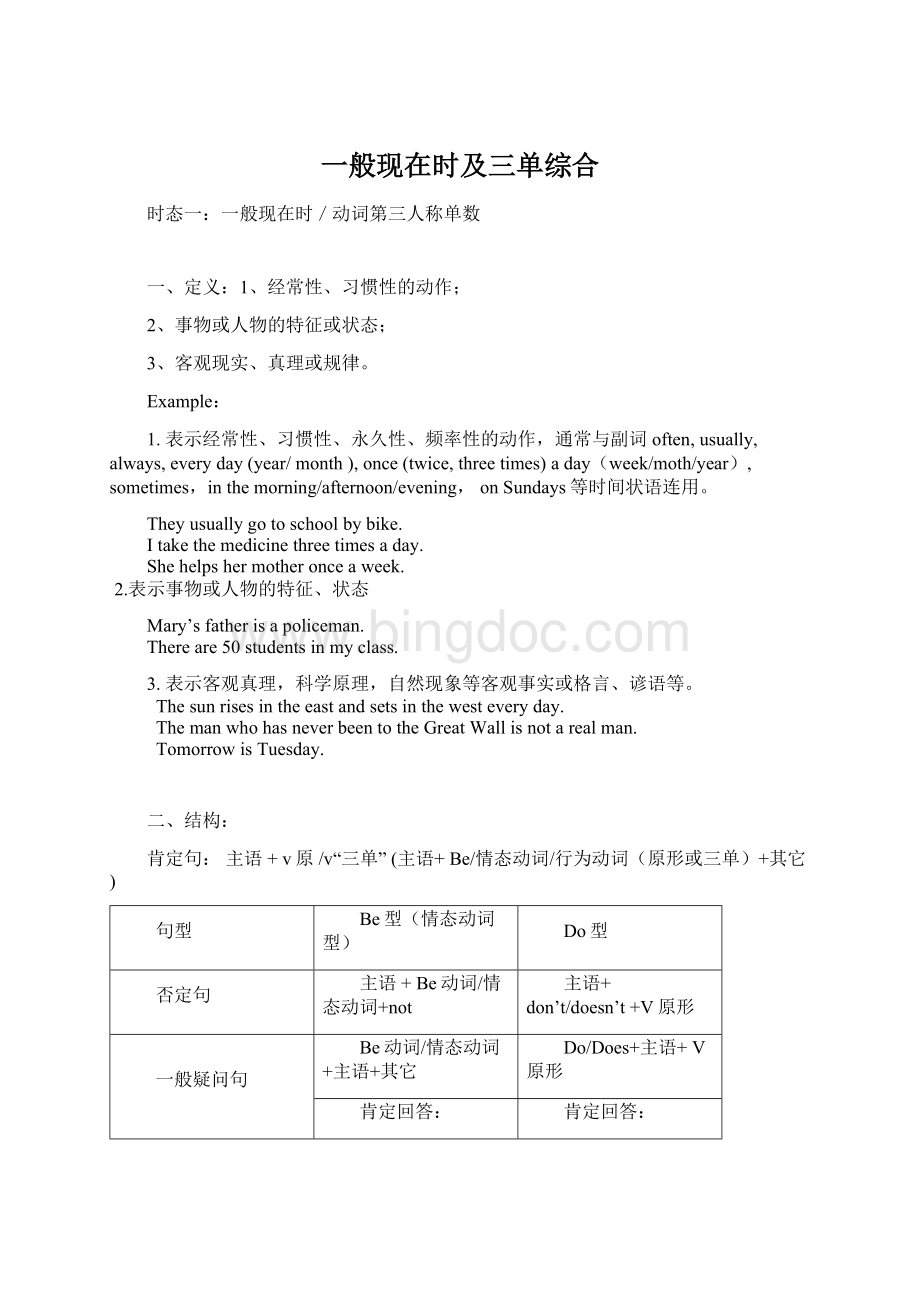一般现在时及三单综合.docx
《一般现在时及三单综合.docx》由会员分享,可在线阅读,更多相关《一般现在时及三单综合.docx(13页珍藏版)》请在冰点文库上搜索。

一般现在时及三单综合
时态一:
一般现在时/动词第三人称单数
一、定义:
1、经常性、习惯性的动作;
2、事物或人物的特征或状态;
3、客观现实、真理或规律。
Example:
1.表示经常性、习惯性、永久性、频率性的动作,通常与副词often,usually,always,everyday(year/month),once(twice,threetimes)aday(week/moth/year),sometimes,inthemorning/afternoon/evening,onSundays等时间状语连用。
Theyusuallygotoschoolbybike.
Itakethemedicinethreetimesaday.
Shehelpshermotheronceaweek.
2.表示事物或人物的特征、状态
Mary’sfatherisapoliceman.
Thereare50studentsinmyclass.
3.表示客观真理,科学原理,自然现象等客观事实或格言、谚语等。
Thesunrisesintheeastandsetsinthewesteveryday.
ThemanwhohasneverbeentotheGreatWallisnotarealman.
TomorrowisTuesday.
二、结构:
肯定句:
主语+v原/v“三单”(主语+Be/情态动词/行为动词(原形或三单)+其它)
句型
Be型(情态动词型)
Do型
否定句
主语+Be动词/情态动词+not
主语+don’t/doesn’t+V原形
一般疑问句
Be动词/情态动词+主语+其它
Do/Does+主语+V原形
肯定回答:
Yes,主语+Be动词/情态动词.
肯定回答:
Yes,主语+do/does.
否定回答:
No,主语+Be动词/情态动词+not.
否定回答:
No,主语+don’t/doesn’t.
否定句:
主语+Be/情态动词/do/dose+not+其它
一般疑问句:
Be/情态动词/do/dose+主语+其它
特殊疑问句:
特殊疑问词+Be动词/情态动词/do/dose+主语+其它(对主语提问除外)
对主语提问的特殊疑问句=特殊疑问词+主语+动词原形/三单(肯定句的结构)+?
总结:
行为动词表示具体的动作,be动词表示状态,情态动词表示态度。
在做肯定陈述的时候,运用的规则是:
有do无be;无do一定要加be。
另外,一定要小心:
在做句型转换(否定、疑问)的时候,要分别遵守自己的约定:
行为动词要请do/does帮忙;有be就直接用be(be提前变成问句,在后面加上not变成否定句)。
三、第三人称单数(三单)
1、除了我(I)和你(you)我们(we)你们(you)他们(they)之外都是三单,人称代词he,she,it是第三人称单数。
如:
HelikeswatchingTV.他喜欢看电视。
Shehaslunchattwelve.她十二点吃午餐。
Itlookslikeacat.它看起来像只猫。
2、单个人名、地名或称呼作主语;是第三人称单数。
如:
HanMeilookslikehermother.韩梅看起来像她的母亲。
BeijingisinChina.北京在中国。
UncleWangoftenmakescakes.王叔叔经常做蛋糕。
3、单数可数名词或"this/that/the+单数可数名词"作主语时,是第三人称单数。
如:
Ahorseisausefulanimal.马是有用的动物。
Thisbookisyours.这本书是你的。
Thatcarisred.那辆小汽车是红色的。
ThecatisLucy's.这只猫是露茜的。
4、不定代词someone,somebody,nobody,everything,something等及指示代词this,that作主语时,是第三人称单数。
如:
Everyoneishere.大家到齐了。
Thereissomethingwrongwiththewatch.这块手表有毛病。
Thisisapen.这是一支钢笔。
Thatisaneraser.那是一块橡皮擦。
5、不可数名词作主语时为第三人称单数。
如:
Themilkisintheglass.牛奶在玻璃杯里。
Thebreadisverysmall.那面包很小。
6、当数字或字母作主语时,看作第三人称单数。
如:
"6"isaluckynumber."6"是个吉利数字。
"I"isaletter."I"是个字母。
四、动词三单变化规则
1、一般情况下加S:
ask---asks learn----learns work---works get---gets like—likes
play—plays stay---stays
2、以“s,x,ch,sh,o”结尾的,在词尾加“es”:
teach-teacheswash----washesgo-goesdo-does
3、以辅音字母加“y”结尾的,先将“y”变为“i”,然后在加“es”:
study-studiesfly-fliescry---cries try---triescarry-carriesworry-worries
4、以元音字母加Y的,直接加S,(此种情况可直接归入第1类)
如say—says
5、记住3个特殊的:
Be动词(isare)的三单-is
have的三单-has
Do的三单—does
五、句型转换
一、陈述句变一般疑问句、否定句
1、Be型、情态动词型
否定句:
直接在be动词或情态动词后面加not.
疑问句:
则把be动词或情态动词(can,could等等)提到主语的前面
例:
①陈述句:
Sheisastudent.
疑问句→Issheastudent?
否定句→Sheisnotastudent.
②陈述句:
Icanswim.
疑问句→Canyouswim?
yes,Ican.No,Ican’t.
否定句→Icannotswim.
2、Do型
否定句:
主语+don’t/doesn’t+谓语动词原形
疑问句:
Do/Does+主语+动词原形
例:
①陈述句:
Wegetupat7:
00everymorning.
否定句→Wedon’tgetupat7:
00everymorning.
疑问句→Doyougetupat7:
00everymorning?
②陈述句:
Shehasalittlebrother.
否定句→Shedoesn’thavealittlebrother.
疑问句→Doesshehavealittlebrother?
3、注意“变变变变”
(1)I、we—>you、you
(2)句号变问号;
(3)Does(三单)、Did(过去式)来帮忙,动词变V原;
(4)some->anysomething->anythingsomebody->anybody
already->yettoo->either
both->neitherall->none
eg:
AreyoufromJapan﹖Yes,Iam./No,I'mnot.
Ishersisterdoingherhomeworknow﹖Yes,sheis./No,sheisn't.
Doesheworkinabank﹖Yes,hedoes./No,hedoesn't.
Doyoulivenearyourschool﹖Yes,Ido./No,Idon't.
CanyouspeakFrench﹖Yes,Ican./No,Ican't.
MayIgohomenow﹖Yes,youmay./No,youmustn't.
二、陈述句变特殊疑问句(不能用yes/no回答的疑问句)
1、常见的疑问词
when:
问时间(回答用At/On...等)
where:
哪里(状语)
who:
谁(回答用Heis...Sheis...Theyare...等)
whom:
谁(宾格)
whose:
谁的(回答用Itis..These/Thoseare等)
what:
什么
How:
怎么样(对近况提问,回答用形容词,问程度)
which:
哪一个,哪个
why:
为什么(回答用Because,问原因)
记法:
特殊疑问词的开头一般是wh或h;
注意:
特殊疑问句一般读降调(↓)
常见的疑问短语
whattime:
问时间点
whatcolor:
什么颜色(表语)
whatweather:
什么天气
whatsubject:
什么学科
whatjob:
什么职业
whatnationality:
对国籍提问
whatkind:
哪一种类型
-
Howfast:
多快(速度)
Howmany:
多少数量(可数)
Howmuch:
多少钱价格(不可数)
Howlong:
多长(可用于时间,问做多长时间)
Howoften:
多少次(问频率)(频率副词)
Howfar:
多远路程
Howsoon:
多久
Howold:
多少岁
2、特殊疑问句有两种语序:
(1)如疑问词作主语或主语的定语,即对主语或主语的定语提问,其语序是陈述句的语序:
Whoissingingintheroom﹖
whosebikeisbroken﹖
(2)如疑问词作其他成分,即对其他成分提问,其语序是:
特殊疑问词+一般疑问句【即:
特殊疑问词+be/助动词/情态动词+主语+谓语】
Whatdoesshelike?
Whatclassareyouin﹖
Whereareyoufrom﹖
Whattimedoeshegetupeverymorning﹖
Howdoyouknow﹖
(3)就划线部分提问解题方法:
一换二变三提前
一换:
找出正确的疑问词或词组替换划线部分
什么东西->what,地点->where时间->when,怎么样->how
多少->howmany(可数)howmuch(不可数)
动作划线->看形式,然后选择助动词,做的事情用what
Eg:
TheyreadEnglishbooksintheafternoon. What
TheyreadEnglishbooksintheclassroomeveryday. Where
TheyreadEnglishbooksintheclassroominthemorning. When
Ihavegotfivebooks. Howmany
Igotoschoolbybikeeveryday. How
Tomsingssongsinthelivingroomeveryevening. doeswhat
Wereadbookseveryday. dowhat
二变:
将替换完的句子根据规则变为一般疑问句
eg:
Tomswimsinthepooleveryday.
Tomdoeswhatinthepooleveryday.
DoesTomdowhatinthepooleveryday?
三提前:
将变完的一般疑问句中的特殊疑问词提前
eg:
DoesTomdowhatinthepooleveryday?
WhatdoesTomdointhepooleveryday?
注意:
Iliketakingphotointhepark.
Ilikedoingwhatinthepark.
Whatdoyoulikedoinginthepark?
练习一:
一般现在时/三单的练习题
(一).用动词的适当形式填空
1.She_________(go)toschoolatseveno’clock.
2.It’s6 o’clock.Theyare_________(eat)supper.
3.Heusually___________upat17:
00.(get)
4.She___________(live)inBeijing.
5.Amy_________(be)herejustnow.
6._______(be)thereaflyonthetablejustnow?
7.Myfather__________(watch)TVeveryevening.
8.Myfather_______________(make)toysthesedays.
9.________Amy_________(read)Englisheveryday?
10.ChenJiesometimes_________(go)totheparkwithhersister.
(二).选择填空
1.Iwant____homeworknow.A.doing B.todo C.todomy D.domy
2.It'stime______.
A.gotoschool B.playgames C.togohome D.todomyhomeworks
3.______goandhelpher. A.Let'sme B.Let'sus C.Let's D.Let'sto
4.Dotheyhaveanewcar?
Yes,_____.
A.theyare B.theyhave C.theydon't D.theydo
5.Heoften_________supperat6:
00intheevening.
A.have B.has c.ishaving D.iseating
6.We_____________anyChineseclassesonFriday.
A.arehaving B.aren’thaving C.don’thave D.arehave
(三)、用括号内动词的适当形式填空。
1.Heoften_________(have)dinnerathome.
2.DanielandTommy_________(be)inClassOne.
3.We_________(notwatch)TVonMonday.
4.Nick_________(notgo)tothezooonSunday.
5.they_________(like)theWorldCup?
6.Whattheyoften_________(do)onSaturdays?
7.yourparents_________(read)newspaperseveryday?
8.Thegirl_________(teach)usEnglishonSundays.
9.SheandI_________(take)awalktogethereveryevening.
10.There_________(be)somewaterinthebottle.
11.Mike_________(like)cooking.
12.They_________(have)thesamehobby.
13.Myaunt_________(look)afterherbabycarefully.
14.Youalways_________(do)yourhomeworkwell.
15.I_________(be)ill.I’mstayinginbed.
16.She_________(go)toschoolfromMondaytoFriday.
17.LiuTao_________(do)notlikePE.
18.Thechildoften_________(watch)TVintheevening.
19.WangKaiandWangli_________(have)eightlessonsthisterm.
20.-Whatday_________(be)ittoday?
-It’sSaturday.
1. Weoften___________(play)intheplaygound.
2. He_________(get)upatsixo’clock.
3.__________you_________(brush)yourteetheverymorning.
4.What__________(do)heusually (do)afterschool?
5.Danny__________(study)English,Chinese,Maths,ScienceandArtanschool.
6.Mikesometimes__________(go)totheparkwithhissister.
7.Ateightatnight,she__________(watch)TVwithhisparents.
8.________Mike________(read)Englisheveryday?
9.Howmanylessons_________yourclassmate________(have)onMonday?
10.Whattime_________hismother_________(do)thehousework?
练习二:
一般现在时句型转换
1.Doyouoftenplayfootballafterschool?
肯定回答:
2.Ihavemanybooks.改为否定句:
3.GaoShan’ssisterlikesplayingtabletennis
改为否定句:
4.ShelivesinasmalltownnearNewYork.
改为一般疑问句:
5.IwatchTVeveryday.改为一般疑问句:
6.Davidhasgotagoal.改为一般疑问句:
7.Wehavefourlessons.否定句:
8.Nancydoesn’trunfast肯定句:
9.Mydogrunsfast.否定句:
一般疑问句:
10. Mikehastwolettersforhim.一般疑问句:
否定句:
11. Iusually(playfootball)onFridayafternoon.
否定句:
一般疑问句:
针对括号内容提问:
12. SuYangusuallywashessomeclothesonSaturday.
否定句:
一般疑问句:
划线提问:
13. Mingmingusuallywaterstheflowerseveryday
否定句:
一般疑问句:
划线提问
14. Tomdoeshishomeworkathome.
否定句:
一般疑问句:
划线提问句:
练习三:
动词一般现在时专练
☆通过下列练习,你能否找到一些可用的规律?
肯定句
1.We_____(play)footballeveryday.
2.Jim_____(want)anorange.
3.Mymother______(watch)TVintheevening.
4.She______(know)alittle(一点儿)English.
5.Myfatheralways________(come)backfromworkverylate.
6.Theteacherisbusy.He________(sleep)sixhoursaday.
7.Thegirl_______(like)wearingaskirt.
8.We_____(go)toschoolat7:
30inthemorning.
9.He_______TVeveryevening.(watch)
10.Tom,withhisclassmates,often______footballafterschool.(play)
11.Yourshoes_______underthebed.(be)
12.Hisuncleusually_________toworkbybus.(go)
一般疑问句:
1._______you_______(like)English?
2._______yourbrother_______(know)Japanese?
3._______you_______(brush)yourteetheverymorning?
4._______Mike___